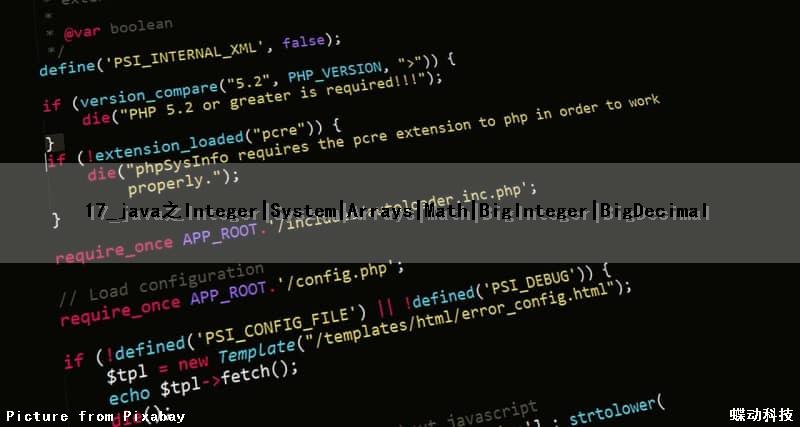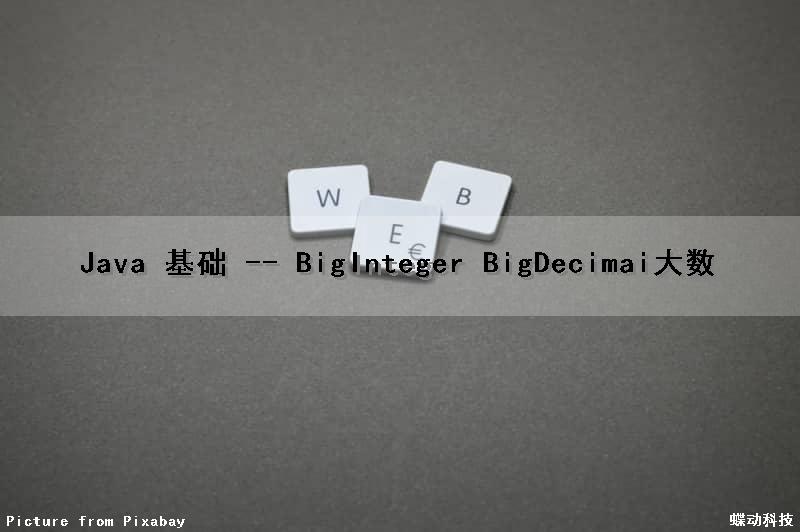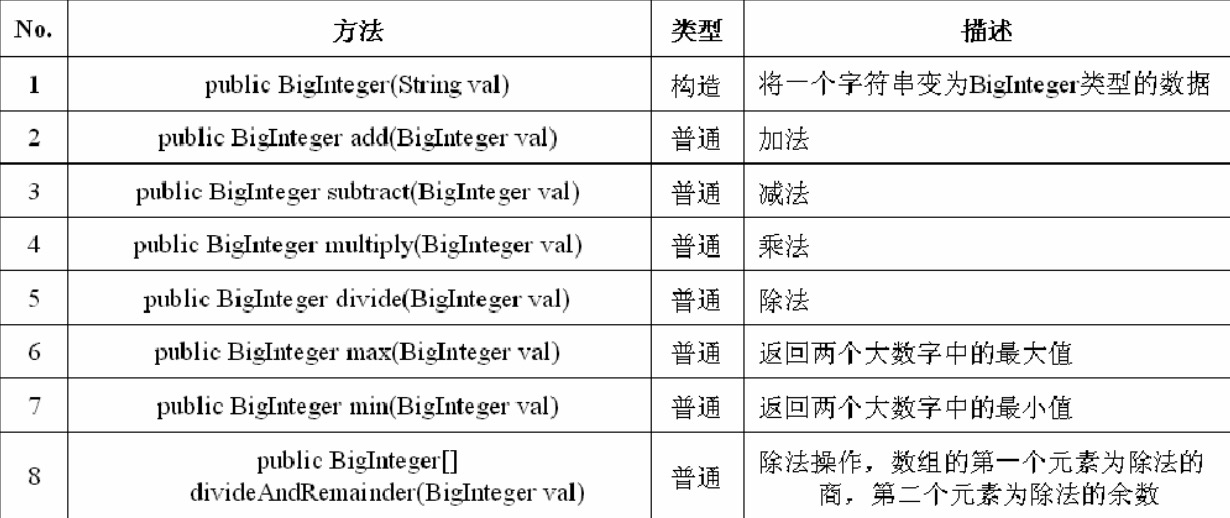<span>import<span> java.util.Calendar;
<span>import<span> java.util.Scanner;
<span>/*<span>
-
获取任意一年的二月有多少天
-
-
分析:
-
A:键盘录入任意的年份
-
B:设置日历对象的年月日
-
年就是A输入的数据
-
月是2
-
日是1
-
C:把时间往前推一天,就是2月的最后一天
-
D:获取这一天输出即可
<span>*/
<span>public <span>class<span> CalendarTest {
<span>public <span>static <span>void<span> main(String[] args) {
<span>//<span> 键盘录入任意的年份
Scanner sc = <span>new<span> Scanner(system.in);
System.out.println("请输入年份:"<span>);
<span>int year =<span> sc.nextInt();
</span><span>//</span><span> 设置日历对象的年月日</span>
Calendar c =<span> Calendar.getInstance();
c.set(year,</span>2,1); <span>//</span><span> 其实是这一年的3月1日
</span><span>//</span><span> 把时间往前推一天,就是2月的最后一天</span>
c.add(Calendar.DATE,-1<span>);
</span><span>//</span><span> <a href="https://www.jb51.cc/tag/huoqu/" target="_blank">获取</a>这一天<a href="https://www.jb51.cc/tag/shuchu/" target="_blank">输出</a>即可</span>
<span> System.out.println(c.get(Calendar.DATE));
}
}

17_java之Integer|System|Arrays|Math|BigInteger|BigDecimal
01基本数据类型对象包装类概述
*A:基本数据类型对象包装类概述
*a.基本类型包装类的产生
在实际程序使用中,程序界面上用户输入的数据都是以字符串类型进行存储的。而程序开发中,我们需要把字符串数据,
根据需求转换成指定的基本数据类型,如年龄需要转换成int类型,考试成绩需要转换成double类型等
*b.八种基本类型对应的包装类
char Character
int Integer
byte Byte
short Short
long Long
float Float
double Double
boolean Boolean
02Integer类parseInt方法
*A:Integer类parseInt方法:
*a:parseInt()
int i = Integer.parseInt("12");
System.out.println(i/2);//6
*b:parseInt(String s, int radix)
/*
* Integer类静态方法parseInt(String s, int radix)
* radix基数,进制
* "110",2 含义 前面的数字是二进制的,但是方法parseInt运行结果都是十进制
* 指定进制的字符串转换为十进制的整数
*/
public static void function_1(){
int i = Integer.parseInt("110", 2);
System.out.println(i);
}
03Integer类int转成字符串
*A:Integer类int转成字符串:
*a:使用+与字符串拼接
int i = 3;
String s = i+"";
System.out.println(s+1);//"31"
*b:toString(int ,int 进制),任意进制整数转成任意进制的字符串 (了解)
String s1 = Integer.toString(5,2);
System.out.println(s1);
04Integer类构造方法
*A:Integer类构造方法
/*
* Integer类构造方法
* Integer (String s)
* 将数字格式的字符串,传递到Integer类的构造方法中
* 创建Integer对象,包装的是一个字符串
* 将构造方法中的字符串,转成基本数据类型,调用方法,非静态的, intValue()
*/
public static void function_3(){
Integer in = new Integer("100");
int i = in.intValue();
System.out.println(--i);//99
}
05Integer类其他方法
*A:Integer类其他方法
/*
* Integer类的3个静态方法
* 做进制的转换
* 十进制转成二进制 toBinarString(int)
* 十进制转成八进制 toOctalString(int)
*十进制转成十六进制 toHexString(int)
* 三个方法,返回值都是以String形式出现
*/
a:十进制转二,八,十六进制
public static void function_1(){
System.out.println(Integer.toBinaryString(99));
System.out.println(Integer.toOctalString(99));
System.out.println(Integer.toHexString(999));
}
b:获取int的最大值和最小值
/*
* Integer类的静态成员变量
* MAX_VALUE * MIN_VALUE
*/
public static void function(){
System.out.println(Integer.MAX_VALUE);
System.out.println(Integer.MIN_VALUE);
}
06自动装箱和自动拆箱
*A:自动装箱与自动拆箱:
//JDK1.5新特性
//自动装箱,拆箱的 好处: 基本类型和引用类直接运算
//自动装箱:使用Integer.valueOf(整数值)返回一个封装了该整数值的Integer对象
//自动拆箱:使用Integer对象.intValue()返回Integer对象中封装的整数值 public static void function(){
//引用类型 , 引用变量一定指向对象 //自动装箱, 基本数据类型1, 直接变成了对象
Integer in = 1; // Integer in = new Integer(1)
//in 是引用类型,不能和基本类型运算, 自动拆箱,引用类型in,转换基本类型
//in+1 ==> in.inValue()+1 = 2
//in = 2 自动装箱
in = in + 1;
System.out.println(in);
}
07自动装箱和自动拆箱(当心陷阱!!!)
*A:自动装箱与自动拆箱:
Integer i = new Integer(1);
Integer j = new Integer(1);
System.out.println(i==j); // false 比较的是地址
System.out.println(i.equals(j)); // true 继承的是Object重写equals,比较的对象的数据值
System.out.println("===================");
Integer a = 500;//Integer integer=Integer.valueOf(500)
//integer=new Integer(500);
Integer b = 500;
System.out.println(a==b);//false
System.out.println(a.equals(b));//true
System.out.println("===================");
//数据在byte(-128~127)范围内,JVM不会从新new对象
Integer aa = 127; // Integer aa = new Integer(127)
Integer bb = 127; // Integer bb = aa;
System.out.println(aa==bb); //true
System.out.println(aa.equals(bb));//true
08System类方法currentTimeMillis
A:System类方法currentTimeMillis():用于计算程序的执行时间 /* * 获取系统当前毫秒值 * static long currentTimeMillis() * 对程序执行时间测试 */
public static void function(){ long start = System.currentTimeMillis();
//当前时间x-1970年1月1日零时零分零秒 for(int i = 0 ; i < 10000; i++){ System.out.println(i); } long end = System.currentTimeMillis();
//当前时间y-1970年1月1日零时零分零秒 System.out.println(end - start);//当前时间y-当前时间x }
09System类方法exit
*A:System类方法exit()方法
/*
* 退出虚拟机,所有程序全停止
* static void exit(0)
*/
public static void function_1(){
while(true){
System.out.println("hello");
System.exit(0);//该方法会在以后的finally代码块中使用(讲到再说)
}
}
10System类方法gc
A:System类方法gc public class Person { public void finalize(){ System.out.println("垃圾收取了"); } }
/*
* JVM在内存中,收取对象的垃圾
* 当没有更多引用指向该对象时,会自动调用垃圾回收机制回收堆中的对象
* 同时调用回收对象所属类的finalize方法()
* static void gc()
*/
public static void function_2(){
new Person();
new Person();
new Person();
new Person();
new Person();
new Person();
new Person();
new Person();
System.gc();
}
11System类方法getProperties
A:System类方法getProperties(了解)
/*
* 获取当前操作系统的属性:例如操作系统名称,
* static Properties getProperties()
*/
public static void function_3(){
System.out.println( System.getProperties() );
}
12System类方法arraycopy
A:System类方法arraycopy:
/*
* System类方法,复制数组
* arraycopy(Object src, int srcPos, Object dest, int destPos, int length)
* Object src, 要复制的源数组
* int srcPos, 数组源的起始索引
* Object dest,复制后的目标数组
* int destPos,目标数组起始索引
* int length, 复制几个
*/
public static void function_4(){
int[] src = {11,22,33,44,55,66};
int[] desc = {77,88,99,0};
System.arraycopy(src, 1, desc, 1, 2);//将src数组的1位置开始(包含1位置)的两个元素,拷贝到desc的1,2位置上
for(int i = 0 ; i < desc.length ; i++){
System.out.println(desc[i]);
}
}
13Math类的方法_1
A:Math类中的方法 /*
static double sqrt(double d)
返回参数的平方根*/public static void function_4(){ double d = Math.sqrt(-2); System.out.println(d);}
/*0
static double pow(double a, double b)
a的b次方*/public static void function_3(){double d = Math.pow(2, 3);System.out.println(d);}
/*
static double floor(double d)
返回小于或者等于参数d的最大整数*/public static void function_2(){double d = Math.floor(1.5);System.out.println(d);}
/*
static double ceil(double d)
返回大于或者等于参数d的最小整数*/public static void function_1(){double d = Math.ceil(5.1);System.out.println(d);}
/*
static int abs(int i)
获取参数的绝对值*/ public static void function(){int i = Math.abs(0);System.out.println(i); }
14Math类的方法_2
A:Math类的方法_2 /*
static double round(doubl d)
获取参数的四舍五入,取整数*/ public static void function_6(){ double d = Math.round(5.4195); System.out.println(d); }
/*
static double random() 返回随机数 0.0-1.0之间
来源,也是Random类*/
public static void function_5(){
for(int i = 0 ; i < 10 ;i++){
double d = Math.random(); System.out.println(d);
} }
15Arrays工具类
A:Arrays工具类: public class ArraysDemo { public static void main(String[] args) {
function_2(); int[] arr = {56,65,11,98,57,43,16,18,100,200};
int[] newArray = test(arr); System.out.println(Arrays.toString(newArray));
}
/*
* 定义方法,接收输入,存储的是10个人考试成绩 * 将最后三个人的成绩,存储到新的数组中,返回新的数组
*/ public static int[] test(int[] arr){
//对数组排序 Arrays.sort(arr);
//将最后三个成绩存储到新的数组中 int[] result = new int[3];
//成绩数组的最后三个元素,复制到新数组中
// System.arraycopy(arr, 0, result, 0, 3); for(int i = 0 ; i < 3 ;i++){ result[i] = arr[i]; } return result; }
/*
* static String toString(数组)
* 将数组变成字符串
*/
public static void function_2(){
int[] arr = {5,1,4,6,8,9,0};
String s = Arrays.toString(arr);
System.out.println(s);
}
/*
* static int binarySearch(数组, 被查找的元素)
* 数组的二分搜索法
* 返回元素在数组中出现的索引
* 元素不存在, 返回的是 (-插入点-1)
*/
public static void function_1(){
int[] arr = {1,4,7,9,11,15,18};
int index = Arrays.binarySearch(arr, 10);
System.out.println(index);
}
/*
* static void sort(数组)
* 对数组升序排列
*/
public static void function(){
int[] arr = {5,1,4,6,8,9,0};
Arrays.sort(arr);
for (int i = 0; i < arr.length; i++) {
System.out.println(arr[i]);
}
}
}
16数组复制练习
*A:数组复制练习:
public static void main(String[] args) {
int[] arr = {56,65,11,98,57,43,16,18,100,200};
int[] newArray = test(arr);
System.out.println(Arrays.toString(newArray));
}
/*
* 定义方法,接收输入,存储的是10个人考试成绩
* 将最后三个人的成绩,存储到新的数组中,返回新的数组
*/
public static int[] test(int[] arr){
//对数组排序 Arrays.sort(arr);
//将最后三个成绩存储到新的数组中 int[] result = new int[3];
//成绩数组的最后三个元素,复制到新数组中
//System.arraycopy(arr, 0, result, 0, 3); for(int i = 0 ; i < 3 ;i++){ result[i] = arr[i]; } return result; }
17BigInteger类概述和构造方法
A:BigInteger类概述和构造方法
public static void main(String[] args) { function(); }
/*
*BigInteger类的构造方法
*传递字符串,要求数字格式,没有长度限制
**/
public static void function(){
BigInteger b = new BigInteger("8465846668464684562385634168451684568645684564564");
System.out.println(b);
BigInteger b1 = new BigInteger("5861694569514568465846668464684562385634168451684568645684564564");
System.out.println(b1);
}
18BigInteger类四则运算
A:BigInteger类四则运算 public static void main(String[] args) { function_1(); }
/*
* BigInteger对象的四则运算
* 调用方法计算,计算结果也只能是BigInteger对象
*/
public static void function_1(){
BigInteger b1 = new BigInteger("5665464516451051581613661405146");
BigInteger b2 = new BigInteger("965855861461465516451051581613661405146");
//计算 b1+b2对象的和,调用方法 add
BigInteger bigAdd = b1.add(b2);//965855867126930032902103163227322810292
System.out.println(bigAdd);
//计算b1-b2对象的差,调用方法subtract
BigInteger bigSub = b1.subtract(b2);
System.out.println(bigSub);
//计算b1*b2对象的乘积,调用方法multiply
BigInteger bigMul = b1.multiply(b2);
System.out.println(bigMul);
//计算b2/b1对象商,调用方法divied
BigInteger bigDiv = b2.divide(b1);
System.out.println(bigDiv);
}
19员工案例的子类的编写
A:BigDecimal类概述
/*
* 计算结果,未知
* 原因: 计算机二进制中,表示浮点数不精确造成
* 超级大型的浮点数据,提供高精度的浮点运算, BigDecimal
System.out.println(0.09 + 0.01);//0.09999999999999999
System.out.println(1.0 - 0.32);//0.6799999999999999
System.out.println(1.015 * 100);//101.49999999999999
System.out.println(1.301 / 100);//0.013009999999999999
*/
20BigDecimal类实现加法减法乘法
A:BigDecimal类实现加法减法乘法 /*
BigDecimal实现三则运算
**/
public static void function(){
BigDecimal b1 = new BigDecimal("0.09");
BigDecimal b2 = new BigDecimal("0.01");
//计算b1+b2的和,调用方法addBigDecimal bigAdd = b1.add(b2);System.out.println(bigAdd);
BigDecimal b3 = new BigDecimal("1");
BigDecimal b4 = new BigDecimal("0.32");
//计算b3-b2的差,调用方法subtractBigDecimal
bigSub = b3.subtract(b4);
System.out.println(bigSub);
BigDecimal b5 = new BigDecimal("1.015");
BigDecimal b6 = new BigDecimal("100");
//计算b5*b6的成绩,调用方法
multiplyBigDecimal bigMul = b5.multiply(b6);
System.out.println(bigMul);}
21BigDecimal类实现除法
A:BigDecimal类实现除法
/*
* BigDecimal实现除法运算
* divide(BigDecimal divisor, int scale, int roundingMode)
* int scale : 保留几位小数
* int roundingMode : 保留模式
* 保留模式 阅读API文档
* static int ROUND_UP 向上+1
* static int ROUND_DOWN 直接舍去
* static int ROUND_HALF_UP >= 0.5 向上+1
* static int ROUND_HALF_DOWN > 0.5 向上+1 ,否则直接舍去
*/
public static void function_1(){
BigDecimal b1 = new BigDecimal("1.0301");
BigDecimal b2 = new BigDecimal("100");
//计算b1/b2的商,调用方法divied
BigDecimal bigDiv = b1.divide(b2,2,BigDecimal.ROUND_HALF_UP);//0.01301
System.out.println(bigDiv);
}

3.2. 数学类(Math、BigInteger、BigDecimal)
1. Math类
Math类提供了一些基本的数学函数,如求平方根、绝对值、三角函数等。它是一个final类,并且所有的方法都是static的,因此无需创建对象,直接使用类名调用方法即可。
以下是Math类的一些常用方法:
abs(double a):返回参数的绝对值。ceil(double a):返回大于或等于参数的最小整数值。floor(double a):返回小于或等于参数的最大整数值。round(double a):返回参数四舍五入后的整数值。max(double a, double b):返回两个参数中的最大值。min(double a, double b):返回两个参数中的最小值。sqrt(double a):返回参数的平方根。pow(double a, double b):返回a的b次幂。sin(double a):返回参数的正弦值。cos(double a):返回参数的余弦值。tan(double a):返回参数的正切值。
2. BigInteger类
BigInteger类表示任意精度的整数。在处理大整数时,int和long的范围可能不够用,此时可以使用BigInteger类。BigInteger类提供了大量的方法来操作大整数,如加法、减法、乘法、除法等。
以下是创建BigInteger对象的一些方法:
BigInteger(String val):根据字符串创建BigInteger对象。valueOf(long val):返回一个等于指定long值的BigInteger对象。
以下是BigInteger类的一些常用方法:
add(BigInteger val):返回两个BigInteger对象的和。subtract(BigInteger val):返回两个BigInteger对象的差。multiply(BigInteger val):返回两个BigInteger对象的积。divide(BigInteger val):返回两个BigInteger对象的商。mod(BigInteger val):返回两个BigInteger对象的余数。pow(int exponent):返回当前BigInteger对象的指定次幂。
3. BigDecimal类
BigDecimal类表示任意精度的小数。在处理需要高精度计算的小数时,float和double的范围和精度可能不够用,此时可以使用BigDecimal类。BigDecimal类提供了大量的方法来操作小数,如加法、减法、乘法、除法等。
以下是创建BigDecimal对象的一些方法:
BigDecimal(String val):根据字符串创建BigDecimal对象。valueOf(double val):返回一个等于指定double值的BigDecimal对象。
以下是BigDecimal类的一些常用方法:
add(BigDecimal val):返回两个BigDecimal对象的和。subtract(BigDecimal val):返回两个BigDecimal对象的差。multiply(BigDecimal val):返回两个BigDecimal对象的积。divide(BigDecimal val, int scale, RoundingMode roundingMode):返回两个BigDecimal对象的商,保留指定小数位数,并使用指定的舍入模式。setScale(int newScale, RoundingMode roundingMode):返回一个BigDecimal对象,保留指定小数位数,并使用指定的舍入模式。
4. 示例
下面是一个使用Math、BigInteger和BigDecimal类的示例:
import java.math.BigDecimal;
import java.math.BigInteger;
import java.math.RoundingMode;
public class Main {
public static void main(String[] args) {
// 使用Math类
System.out.println("绝对值:" + Math.abs(-10)); // 输出 "绝对值:10"
System.out.println("平方根:" + Math.sqrt(9)); // 输出 "平方根:3.0"
System.out.println("最大值:" + Math.max(3, 7)); // 输出 "最大值:7"
// 使用BigInteger类
BigInteger num1 = new BigInteger("987654321098765432");
BigInteger num2 = new BigInteger("123456789012345678");
System.out.println("大整数相加:" + num1.add(num2)); // 输出 "大整数相加:1111111110111111110"
System.out.println("大整数相减:" + num1.subtract(num2)); // 输出 "大整数相减:864197532086419754"
System.out.println("大整数相乘:" + num1.multiply(num2)); // 输出 "大整数相乘:121932631137021795435340303682"
// 使用BigDecimal类
BigDecimal decimal1 = new BigDecimal("123.456");
BigDecimal decimal2 = new BigDecimal("789.012");
System.out.println("高精度小数相加:" + decimal1.add(decimal2)); // 输出 "高精度小数相加:912.468"
System.out.println("高精度小数相减:" + decimal1.subtract(decimal2)); // 输出 "高精度小数相减:-665.556"
// 高精度小数相乘
BigDecimal decimal3 = decimal1.multiply(decimal2);
System.out.println("高精度小数相乘:" + decimal3); // 输出 "高精度小数相乘:97421.697632"
// 高精度小数相除
BigDecimal decimal4 = decimal1.divide(decimal2, 5, RoundingMode.HALF_UP);
System.out.println("高精度小数相除:" + decimal4); // 输出 "高精度小数相除:0.15649"
// 设置小数位数和舍入模式
BigDecimal decimal5 = decimal3.setScale(2, RoundingMode.HALF_UP);
System.out.println("高精度小数保留2位小数:" + decimal5); // 输出 "高精度小数保留2位小数:97421.70"
}
}
通过这个示例,您可以了解到Math、BigInteger和BigDecimal的基本用法和常用方法。在实际编程过程中,您会经常使用这些类来处理数学计算。希望这个介绍能帮助您更好地学习和理解Java中的数学类。


推荐阅读:
https://mp.weixin.qq.com/s/dV2JzXfgjDdCmWRmE0glDA
https://mp.weixin.qq.com/s/an83QZOWXHqll3SGPYTL5g


ACM中java中BigInteger和Decimal用到的主要函数
java中大数以及高精度常用函数
使用java大数类解决问题时我们需要注意两个方面:1、不能有包名,也就是说我们要把主类放到默认的包里,如果你的代码里出现形如package cn.gov.test;这样的代码你很有可能会收获到RE
2、提交的类的类名必须为Main,如果是其他的名字你有可能收获到CE也有可能收获到WA(例如UVA)
Scanner cin=new Scanner(System.in);// 读入
一.BigInteger
import java.math.BigInteger;
BigInteger.ZERO //大整数0 BigInteger.ONE //大整数1 BigInteger.TEN //大整数10
BigInteger.valueOf(long val)//返回一个BigInteger,其值等于指定long。
public BigInteger(String val) //构造 :讲一个字符串变为BigIngeter类型的数据public BigInteger add(BigInteger val) //普通加法public BigInteger subtract(BigInteger val)//普通减法public BigInteger multiply(BigInteger val)//普通乘法public BigInteger divide(BigInteger val)//普通除法public BigInteger max(BigInteger val)//返回两个数中的最大值public BigInteger min(BigInteger val)//返回两者中的最小值public BigInteger[] divideAndRemainder(BigInteger val)//除法操作,数组的第一个元素作为除法的商,第二个元素作为除法的余数
mod(BigInteger val); //求余
gcd(BigInteger val); //求最大公约数 (以下都简写)
abs();//返回此值的绝对值
and(BigInteger val); //返回 this&val 的BigInteger
andNot(BigInteger val); //返回 this&~val 的BigInteger
bitCount(); //返回BIgInteger的二进制补码形式中与符号不同的位的数量
compareTo(BigInteger val); //将this 与val比较,大于,等于,小于分别返回1,0,-1;
doubleValue(); //将此BigInteger转换为double型返回;
getLowestSetBit();//返回此BigInteger最右端1比特的索引;
hashCode();//返回此BIgInteger的哈希码;
isProbablePrime();//判断是否为素数(true/false);
modInverse(BigInteger m);返回其值为( mod m)的BigInteger;
negate();返回(-this)的BigInteger;
not();// ~this
or(BIgInteger val);// 返回(this | val)
xor(BigInteger val);返回(this^val);
toString(int radix);//返回指定基数的字符串形式
shiftRight(int n);//返回(this>>n)的BigInteger
shiftLeft(int n);//返回值为(thsi<<n)的BigInteger
示例:
public class Main{
public static void main(String[] args) {
BigInteger bi1 = new BigInteger("123456789") ; // 声明BigInteger对象
BigInteger bi2 = new BigInteger("987654321") ; // 声明BigInteger对象
System.out.println("加法操作:" + bi2.add(bi1)) ; // 加法操作
System.out.println("减法操作:" + bi2.subtract(bi1)) ; // 减法操作
System.out.println("乘法操作:" + bi2.multiply(bi1)) ; // 乘法操作
System.out.println("除法操作:" + bi2.divide(bi1)) ; // 除法操作
System.out.println("最大数:" + bi2.max(bi1)) ; // 求出最大数
System.out.println("最小数:" + bi2.min(bi1)) ; // 求出最小数
BigInteger result[] = bi2.divideAndRemainder(bi1) ;//求出余数的除法操作
System.out.println("商是:" + result[0] +
";余数是:" + result[1]) ;
}
}
二.BigDecimal
import java.math.BigDecimal;
public BigDecimal(double val) //构造 将double表示形式转换为BIgDecimalpublic BigDecimal(int val)//同上public BigDecimal(String val)//将字符串表示形式转换为BigDecimalpublic BigDecimal add(BigDecimal augend)//普通加法public BigDecimal subtract(BigDecimal subtrahend)//普通减法public BigDecimal multiply(BigDecimal multiplicand)//普通乘法public BigDecimal divide(BigDecimal divisor)//普通除法
public BigDecimal pow(int n) //返回大数的n次幂
one.compareTo(two); //在数字上比较大小(大于,等于,小于分别返回1,0 -1);
toString() 将BigDecimal对象的数值转换成字符串。
doubleValue() 将BigDecimal对象中的值以双精度数返回。
floatValue() 将BigDecimal对象中的值以单精度数返回。
longValue() 将BigDecimal对象中的值以长整数返回。
intValue() 将BigDecimal对象中的值以整数返回。
示例:
public class Main{
public static void main(String[] args) {
System.out.println("加法运算:" + MyMath.round(MyMath.add(10.345,3.333),1)) ;
System.out.println("减法运算:" + MyMath.round(MyMath.sub(10.345,3.333),3)) ;
System.out.println("乘法运算:" + MyMath.round(MyMath.mul(10.345,3.333),4)) ;
System.out.println("除法运算:" + MyMath.div(10.345,3.333,3)) ;
}
}
BigDecimal.setScale()方法用于格式化小数点
setScale(val)表示保留val位小数,默认用四舍五入方式 setScale(val,BigDecimal.ROUND_DOWN)直接删除多余的小数位,如2.35会变成2.3 setScale(val,BigDecimal.ROUND_UP)进位处理,2.35变成2.4 setScale(val,BigDecimal.ROUND_HALF_UP)四舍五入,2.35变成2.4
setScaler(val,BigDecimal.ROUND_HALF_DOWN)四舍五入,2.35变成2.3,如果是5则向下舍
setScaler(val,BigDecimal.ROUND_CEILING)接近正无穷大的舍入
setScaler(val,BigDecimal.ROUND_FLOOR)接近负无穷大的舍入,数字>0和ROUND_UP作用一样,数字<0和ROUND_DOWN作用一样
setScaler(val,BigDecimal.ROUND_HALF_EVEN)向最接近的数字舍入,如果与两个相邻数字的距离相等,则向相邻的偶数舍入.
原文出处:https://www.cnblogs.com/csushl/p/10326634.html
关于Java 基础 -- BigInteger BigDecimai大数和java大数运算biginteger的问题我们已经讲解完毕,感谢您的阅读,如果还想了解更多关于14-03 java BigInteger类,BigDecimal类,Date类,DateFormat类,Calendar类、17_java之Integer|System|Arrays|Math|BigInteger|BigDecimal、3.2. 数学类(Math、BigInteger、BigDecimal)、ACM中java中BigInteger和Decimal用到的主要函数等相关内容,可以在本站寻找。
















